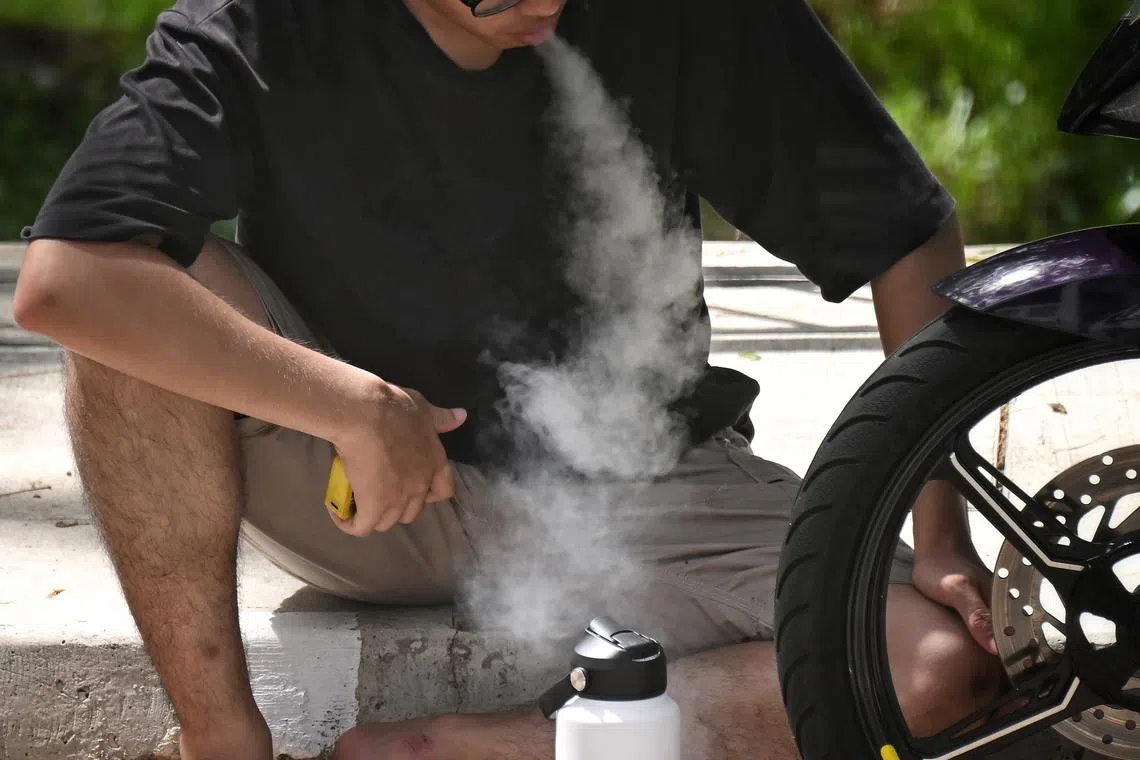Nearly 4,000 people caught possessing or using vapes, about 20 per cent are students
Sign up now: Get ST's newsletters delivered to your inbox

The Ministry of Health and Health Sciences Authority said there was a 52 per cent increase from the previous quarter.
ST PHOTO: KUA CHEE SIONG
SINGAPORE – Nearly 4,000 people in Singapore were caught and fined for possessing or using e-vaporisers over a span of three months, said the health authorities on Oct 23.
The Ministry of Health (MOH) and Health Sciences Authority (HSA) in a joint statement said the 3,840 figure recorded between July 1 and Sept 30 was a 52 per cent increase from the previous quarter.
There were 743 cases of students caught vaping by schools and institutes of higher learning (IHLs), 591 cases caught during community enforcement patrols, 44 cases found through enforcement operations in the vicinity of IHLs, and 16 cases detected at checkpoints.
MOH and HSA said they are working with the Health Promotion Board (HPB) and the Education Ministry to ramp up efforts to tackle the problem of vaping.
The agencies said they are also working with the Immigration and Checkpoints Authority (ICA), National Environment Agency and National Parks Board to carry out enforcement operations on several fronts, including at the checkpoints, on online platforms and in the community, schools and IHLs.
To address the problem in schools, the authorities are focusing their efforts on highlighting the harms of vaping, and that it is illegal in Singapore.
For example, HPB rolled out a campaign in July, which was pushed out across both outdoor advertisements and social media channels.
HPB also put up advisories on the digital platform HealthHub that aim to explain “widespread misconceptions” and falsehoods about vaping, and educate people about the common myths linked to vaping.
It also includes advisories that spell out the health risks and legal implications of vaping. In addition, schools and IHLs have stepped up efforts to teach students about the harmful effects of vaping on individuals, families and society.
Primary and secondary schools also tied up with HPB to teach nearly 37,000 students about the benefits of a nicotine-free lifestyle through skits from July to September.
Students who have been caught vaping have also been given support and strategies to quit. About 830 young people received counselling over the same three-month period.
Online surveillance
HSA said it has been monitoring online content to identify those who vape in public, and use or pose with vapes in photographs or videos.
In July and August, it fined five offenders – four men and a woman, aged between 13 and 34 – who posted content of themselves with vapes on their Instagram and TikTok accounts. The posts have since been removed, said the authorities.
A 49-year-old man’s Tampines home was raided in September after a video of him vaping in an MRT cabin made the rounds on social media.
HSA found an e-vaporiser and other drug paraphernalia in his home. He was also wanted by the Central Narcotics Bureau (CNB) and is currently assisting HSA and CNB in investigations.
Online commerce platforms have also not escaped scrutiny. More than 1,900 listings of vapes and their components were removed from local e-commerce and social media platforms from July to September – more than triple the number compared with the same period in 2023.
Enforcement at high-profile events and at the borders
A total of 253 people were caught through targeted operations at major, high-profile events.
The Formula One race weekend in September, for instance, saw about 200 individuals fined by HSA, while more than 50 who attended an outdoor music event on Sentosa in August were similarly punished.
The bid to stamp out vaping also extended to the borders, with HSA and ICA conducting several joint operations at the air, land and sea checkpoints.
More than 4,000 travellers were checked and 16 were caught with vapes.
A 32-year-old Malaysian man driving a Malaysia-registered lorry was also caught attempting to smuggle vapes at Tuas Checkpoint on July 17. He was found to have more than 20,000 vapes and components with a street value of more than $300,000 in his possession.
He was detained and handed over to HSA for further investigations. While under investigation, he tried to flee Singapore but was caught by ICA two days later.
He was later sentenced to 28 weeks’ jail on Aug 28.
Distribution rings disrupted
The crackdown on vape suppliers over the past few months has also included in-person distribution rings.
On July 7, HSA officers conducted an operation in Paya Lebar involving foreign domestic workers. They intercepted 10 people – eight buyers and two sellers – before any transaction took place.
Eight vapes and assorted components, as well as illegal medicines intended for sale were also seized.
In a separate incident on Aug 21, HSA seized over 2,000 vapes and components with a street value of over $39,000 in Tampines. Eight people aged 26 to 35 were caught distributing the vapes in their vehicles at an open-air carpark.
All offenders in both incidents are currently assisting in investigations.
Court convictions
The possession, use or purchase of vapes carries a maximum fine of $2,000. Those caught importing, distributing, selling or offering vapes for sale and their components can be fined up to $10,000 or jailed for up to six months, or both, for the first offence.
Subsequent offences can result in a fine of up to $20,000, or a jail term of up to a year, or both. All prohibited tobacco items will be seized and confiscated.
There were 21 people aged between 14 and 48 who were convicted from July 1 to Sept 30 for selling vapes and related components in Singapore.
The total fines amounted to more than $150,000, with one offender being fined $39,000 and another jailed for 15 months and fined $10,000.
Members of the public who have information on the illegal possession, use, purchase, import, distribution, sale or offer for sale of vapes can contact HSA’s Tobacco Regulation Branch on 6684-2036 or 6684-2037.



